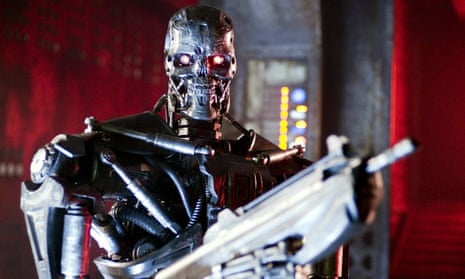In recent years, popular culture has done a pretty good job of scaring us with the threat of machines turning on man. Just think of the red-eyed Terminator, from the movie franchise, shorn of its artificial flesh, the foot soldier of the Skynet artificial intelligence that lost patience with its human overlords and decided to wipe us out. Fortunately, that is science fiction, not science fact. The reality is that machines are among us every day and are becoming increasingly integrated into our lives in positive ways. Hence the report into machine learning, just published by the Royal Society.
Machine learning is best defined as computer systems that can learn from examples, data and experience. We interact with, and benefit from, them every day. Many smartphone apps rely on machine learning: interpreting our voices, tagging friends in photos or searching the internet. (It is also used by online retailers to make recommendations, by email spam filters and by banks to fight credit card fraud.)
Machine learning and the concept of artificial intelligence have been with us a long time. In the 1950s, Alan Turing outlined his test for machine intelligence, which is basically a computer fooling a person into believing it is another person through its responses to questions. In the mid-90s, a computer beat the world chess champion and last year another powered by machine learning beat the world’s best player of the ancient Chinese game Go.
But outside games, it is only in the last few years that these systems have been able to perform specific tasks at similar levels to humans. For example, machine learning systems in computer vision and in speech recognition can now perform as well as, or better than, people. The biggest factor underlying this breakthrough is the explosion in the amount of data available for training the systems. If we think of them as learning from examples, then the number of these training models is now huge in some areas. There have also been important technical advances in the underlying algorithms and in the computer power available to train them.
There is undoubtedly a great deal of potential for machine learning, but one big question remains: how will it affect people’s jobs and their livelihoods? There is an increasing amount of fear, with the likes of Mark Carney, the governor of the Bank of England, talking about machines taking our jobs.
Machine learning will clearly alter the world of work, but how, exactly, is hard to predict. Different studies make very different assessments. In many cases, these computers will augment and enhance human roles. Over the next 10-20 years, they are likely to become good at an increasing number of specific tasks, rather than displaying the range of abilities people have. But there will also be major changes to some roles and losses of others.
Previous industrial and technological revolutions have often predominantly affected specific sectors and roles, such as agriculture or manufacturing. This time, the effects will be much broader and will include the professions. Legal firms are already using machine learning to interrogate databases as part of early-stage research processes, while there are learning systems that can interpret certain medical images better than many doctors.
Society has shown that it is relatively good at adapting to major technological change. As machine learning allows certain tasks to be undertaken more effectively, there will be winners and losers. Some entrepreneurs and companies will do fantastically well, but other people will lose their livelihoods.
As such, we have critical choices to make. Instead of being passive, let’s have an open debate about how the massive benefits from smart computers can be shared broadly. Whether machine learning creates the “foe” of the dystopian vision of Terminator (which, in relation to what can actually be achieved, is still in the realms of science fiction) or a “friend” is largely up to us to decide.
Peter Donnelly is the chair of the Royal Society working group on machine learning and professor of statistical science, University of Oxford
